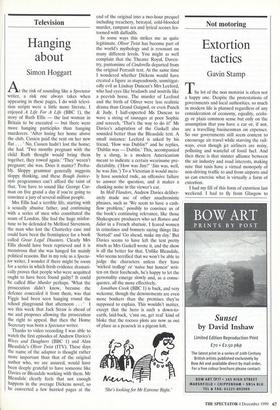Television
Hanging about
Simon Hoggart
At the risk of sounding like a Spectator writer, a risk one always takes when appearing in these pages, I do wish televi- sion scripts were a little more literate. I enjoyed A Life For A Life (BBC 1), the story of Ruth Ellis — the last woman in Britain to be executed — but there were more hanging participles than hanging murderers. 'After losing her home above the club, Cussen paid the rent on her new flat ... ' No, Cussen hadn't lost the home; she had. 'Two months pregnant with the child Ruth thought would bring them together, they rowed again.' They' weren't pregnant; she was. Does it matter? Proba- bly. Sloppy grammar generally suggests sloppy thinking, and these Rough Justice- style programmes can't afford the taint of that. You have to sound like George Car- man on five grand a day if you're going to convince a jury of several million people. Mrs Ellis had a terrible life, starting with a sexually abusive father, and continuing with a series of men who constituted the scum of London. She had the huge misfor- tune to be defended by Melford Stevenson, the man who lost the Chatterley case and could have been the frontispiece for a book called Great Legal Disasters. Clearly Mrs Ellis should have been reprieved and it is monstrous that she was hanged for mainly political reasons. But in my role as a Specta- tor writer, I wonder if there might be room for a series in which fresh evidence dramati- cally proves that people who were acquitted ought to have been found guilty? It could be called Blue Murder perhaps. 'What the prosecution didn't know, because the defence concealed it from them, was that Figgis had been seen hanging round the
school playground that afternoon ' I see this week that Jack Straw is ahead of me and proposes allowing the prosecution the right to appeal. But then the Home Secretary was born a Spectator writer.
Thanks to video recording I was able to watch the first episodes of Andrew Davies's Wives and Daughters (BBC 1) and Alan Bleasdale's Oliver Twist (ITV). These days the name of the adaptor is thought rather more important than that of the original author who, we are assured, would have been deeply grateful to have someone like Davies or Bleasdale working with them. Mr Bleasdale clearly feels that not enough happens in the average Dickens novel, so he converted a few hurried pages at the
end of the original into a two-hour prequel including treachery, betrayal, cold-blooded murder, rampant sex and lyrical scenes fes- tooned with daffodils.
In some ways this strikes me as quite legitimate. Oliver Twist has become part of the world's mythology and is resonant on many different levels. You might as well complain that the Theatre Royal, Daven- try, pantomime of Cinderella departed from the original Perrault text. At the same time I wondered whether Dickens would have created a figure as stupendously, unmitigat- edly evil as Lindsay Duncan's Mrs Leeford, who had eyes like bradawls and nostrils like a peevish horse. The murder of Leeford and the birth of Oliver were less realistic drama than Grand Guignol, or even Punch & Judy. I half-expected Ms Duncan to wave a string of sausages at poor Sophie and screech, 'That's the way to do it!' Mr Davies's adaptation of the Gaskell also sounded better than the Bleasdale text. A small instance: Leeford is asked by his friend, 'How was Dublin?' and he replies, 'Dublin was — Dublin.' This, accompanied by a shrug, is a modern Americanism meant to indicate a certain wearisome pre- dictability. ('How was Jim?' Jim was, well, he was Jim.') To a Victorian it would mere- ly have sounded rude, an offensive failure to answer the question, and it makes a clunking noise in the viewer's ear.
In Moll Flanders, Andrew Davies deliber- ately made use of other anachronistic phrases, such as 'We seem to have a cash- flow problem,' possibly to convince us of the book's continuing relevance, like those Shakespeare producers who set Romeo and Juliet in a French abattoir. I feared women in crinolines and bonnets saying things like 'Sorted!' and `Go ahead, make my day.' But Davies seems to have left the text pretty much as Mrs Gaskell wrote it, and the show is all the better for that. Unlike Bleasdale, who seems terrified that we won't be able to judge the characters unless they have 'wicked trollop' or 'naive but honest' writ- ten on their foreheads, he's happy to let the personality emerge slowly and, as a conse- quence, all the more effectively.
Jonathan Creek (BBC 1) is back, and very welcome, though the denouements are even more honkers than the premises they're supposed to explain. This wouldn't matter, except that the hero is such a down-to- earth, laid-back, 'c'mn on, get real' kind of bloke that the rococo plots are now as out of place as a peacock in a pigeon loft.
'She's looking for Mr Extreme Right.'


















































































 Previous page
Previous page